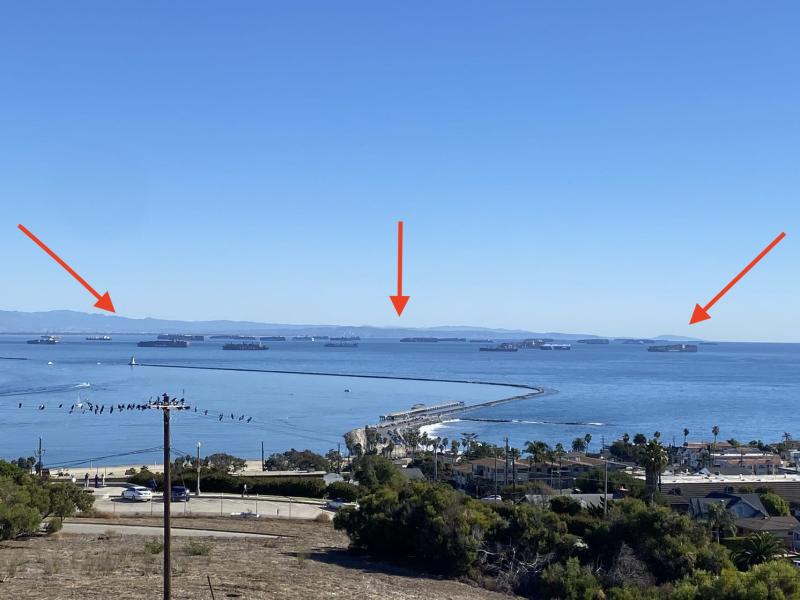A record-breaking 44 container ships are stuck off the coast of California
Category: Now Trending
Via: just-jim-nc-ttth • 3 years ago • 6 commentsBy: htowey@insider.com (Hannah Towey,Grace Kay,Aine Cain) 23 hrs ago (MSN)



 © Brittany Murray/MediaNews Group/Long Beach Press-Telegram via Getty Images Freight ships sitting off the coast of California in January. US ports have experienced some of the worst bottlenecks in more than a decade throughout the COVID-19 pandemic. Brittany Murray/MediaNews Group/Long Beach Press-Telegram via Getty Images
© Brittany Murray/MediaNews Group/Long Beach Press-Telegram via Getty Images Freight ships sitting off the coast of California in January. US ports have experienced some of the worst bottlenecks in more than a decade throughout the COVID-19 pandemic. Brittany Murray/MediaNews Group/Long Beach Press-Telegram via Getty Images
- Forty-four container ships are stuck outside California ports, worsening shipping delays and costs.
- This tops the previous pandemic record, set in February, of 40 ships.
- The ports account for about one-third of US imports, serving as a main source of trade with China.
- See more stories on Insider's business page.
Forty-four freight ships are stuck awaiting entry into California's two largest ports, the highest number recorded since the beginning of the COVID-19 pandemic, the Marine Exchange of Southern California reported on Saturday.
The queue is a result of the labor shortage, COVID-19-related disruptions, and holiday-buying surges. Port of Los Angeles data indicated that the ships' average wait time had increased to 7.6 days.
"The normal number of container ships at anchor is between zero and one," Kip Louttit, the executive director of the Marine Exchange of Southern California, told Insider in July.
California ports in Los Angeles and Long Beach account for about one-third of US imports. These ports operate as a primary source of imports from China and have experienced heavy congestion throughout the pandemic.
"Part of the problem is the ships are double or triple the size of the ships we were seeing 10 or 15 years ago," Louttit said. "They take longer to unload. You need more trucks, more trains, more warehouses to put the cargo."
While the container ships are forced to anchor and await berth space, companies importing and exporting goods to and from Asia expect additional shipping delays.
This comes during one of the busiest months for US-China trade relations, as retailers buy ahead in anticipation of US holidays and China's Golden Week in October, Bloomberg reported.
"To give you a real-life example of the kinds of challenges we're seeing, one of our dedicated charters was recently denied entry into China because a crew member tested positive for COVID, forcing the vessel to return to Indonesia and change the entire crew before continuing," Michael Witynski, Dollar Tree's CEO, said on a Thursday earnings call. "Overall, the voyage was delayed by two months."
Witynski added that a freight forwarder in San Francisco said in a recent transportation webinar that "the transit times from Shanghai to Chicago had more than doubled to 73 days from 35 days." Another carrier executive estimated "that voyages are now taking 30 days longer than in previous years due to port congestion, container handling delays, and other factors," Insider's Aine Cain reported.
"Industry experts expect the ocean shipping capacity will normalize no later than 2023, when many new ships come online," Witynski said.
"Despite record levels of ships in port and at anchor and in drift areas, the Marine Transportation System in LA and LB remains safe, secure, reliable, and environmentally sound, while not being as efficient as it should be due to COVID protocols in these uncertain and unsettled times, and record levels of cargo," the Marine Exchange of Southern California wrote in a statement.
Read the original article on Business InsiderContinue ReadingShow full articles without "Continue Reading" button for {0} hours. Microsoft and partners may be compensated if you purchase something through recommended links in this article.

Tags
Who is online
445 visitors

This is just sad.
I work in transportation; and get to deal with this every day.
Rails have put an embargo on all 40ft containers heading to Los Angeles, it doesn't matter if it is for foreign or domestic. They have stacks of containers sitting at the ramp that they do not have chassis for. Even it they get a chassis for it; there isn't power available to deliver. If it is a Domestic container once it is empty the drayman may have to wait weeks to get a reservation to terminate the empty at the port- which of course ties up the chassis; and exasperates the problems at the ramp.
It is a vicious cycle that will not end even after Covid is gone (if it ever is).
How are they going to resolve this? How will it affect the economy at large? Are we now relying more now on domestic production and less on imports? How does this affect transportation stocks?
The shining star about that is at least "Made in China" garbage is not being sold here.
Buy American. I believe it was said years ago that if you "Buy American, the job you save or create might just be your own."
It also means that cargo from other countries are not reaching US consumers and US exports are not reaching consumers in the FE.
It’s not a shortage of containers but that the containers are in the wrong areas among other problems. The W/C ports are swamped with empties and a shortage of chassis while Asians ports have a shortage of containers. Much of this can be traced back to shipping lines returning to Asia without loading empties back to save time and because of the pandemic. Add to that a shortage of rail cars, chassis, drivers and massive amounts of cargo has led to a perfect storm.
The container shortage is so severe in the FE that vessels are departing without being fully loaded.